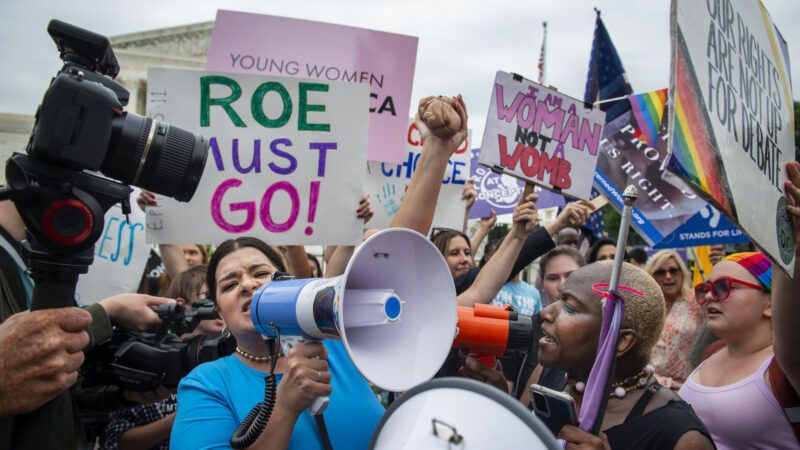When 'Pro-Life' Becomes 'Pro-Censorship'
Antiabortion activists are the new Anthony Comstocks.

The demise of Roe v. Wade has unleashed a flurry of activity by antiabortion activists looking for ways to finish the job. They are now exploring ways to stop people not just from performing abortions but from sharing information about abortion services.
The National Right to Life Committee (NLRC) has drafted model legislation to provide what it calls "an effective enforcement regime" to stamp out abortion. A centerpiece of the proposal would make it a felony to "aid and abet" abortions by "giving instructions over the telephone, the internet, or any other medium of communication regarding self-administered abortions or means to obtain an illegal abortion" or "hosting or maintaining a website, or providing internet service, that encourages or facilitates efforts to obtain an illegal abortion." The law would provide for civil enforcement as well.
These legal tactics and messianic zeal bring to mind Anthony Comstock, the most prominent anti-vice crusader of the 19th and early 20th centuries. Comstock started in 1872 as a vigilante, making "citizen's arrests" of smut peddlers on the streets of New York. But he quickly became, in the words of H.L. Mencken, "the Copernicus of a quite new art and science," one "who first capitalized moral endeavor like baseball or the soap business, and made himself the first of its kept professors."
Comstock had his own model law, which he persuaded Congress to adopt in 1873. It said that no "obscene, lewd, or lascivious book, pamphlet, picture, paper, print, or other publication of an indecent character, or any article or thing designed or intended for the prevention of conception or procuring of an abortion, nor any article or thing intended or adapted for any indecent or immoral use or nature…shall be carried in the mail." This was popularly known as the "Comstock law," and Congress designated him a special agent of the Post Office, vested with the power to enforce the law personally.
Comstock also headed the New York Society for the Suppression of Vice. From these twin positions, he terrorized writers, publishers, free thinkers, birth control advocates, physicians, and artists, jailing thousands and driving at least 15 to suicide. Near the end of his 40-year career, Comstock claimed to have convicted enough people "to fill a passenger train of sixty-one coaches, sixty coaches containing sixty passengers each and the sixty-first almost full." Comstock's law targeted obscenity, but in his mind, anything that related to sex was obscene. This covered information on contraception or abortion, including that found in popular home health guides, such as Edward Bliss Foote's book Medical Common Sense.
Comstock died in 1915, just days after his successful prosecution of William Sanger, husband of birth control advocate Margaret Sanger, for handing out one of his wife's pamphlets on family limitation. Death ended Comstock's career, but not his influence on American law. That didn't happen until much later, as the Supreme Court adopted more robust First Amendment protections for freedom of expression—including, specifically, speech related to abortion and birth control.
Those legal developments make it highly unlikely that NLRC's model legislation will succeed. In Bigelow v. Virginia (1975), the Supreme Court struck down a state law that prohibited encouraging or prompting an abortion by the sale or circulation of any publication. Virginia had prosecuted the publisher of a Virginia-based underground newspaper that had run an ad for legal abortion services in New York at a time when abortion had been illegal in Virginia. Among other things, the advertisement stated that "abortions are now legal in New York," provided contact information "for immediate placement in accredited hospitals and clinics," and offered to "make all arrangements for you and help you with information and counseling."
The Court held the First Amendment protects such speech. It observed that, just as Virginia lacked constitutional authority to prevent its residents from traveling to New York to obtain abortions, it could not, "under the guise of exercising internal police powers, bar a citizen of another State from disseminating information about an activity that is legal in that State." The Court has since upheld the First Amendment right to disseminate information about birth control in numerous cases. And when Congress tried to ban transmitting information about abortion via the internet in the Communications Decency Act in 1996, the Justice Department declined to enforce the law, calling it an obviously unconstitutional.
Comstock wannabes may come and go, but today they must contend with something the old morals crusader did not—strong and well-established constitutional protections for freedom of speech.


Show Comments (203)